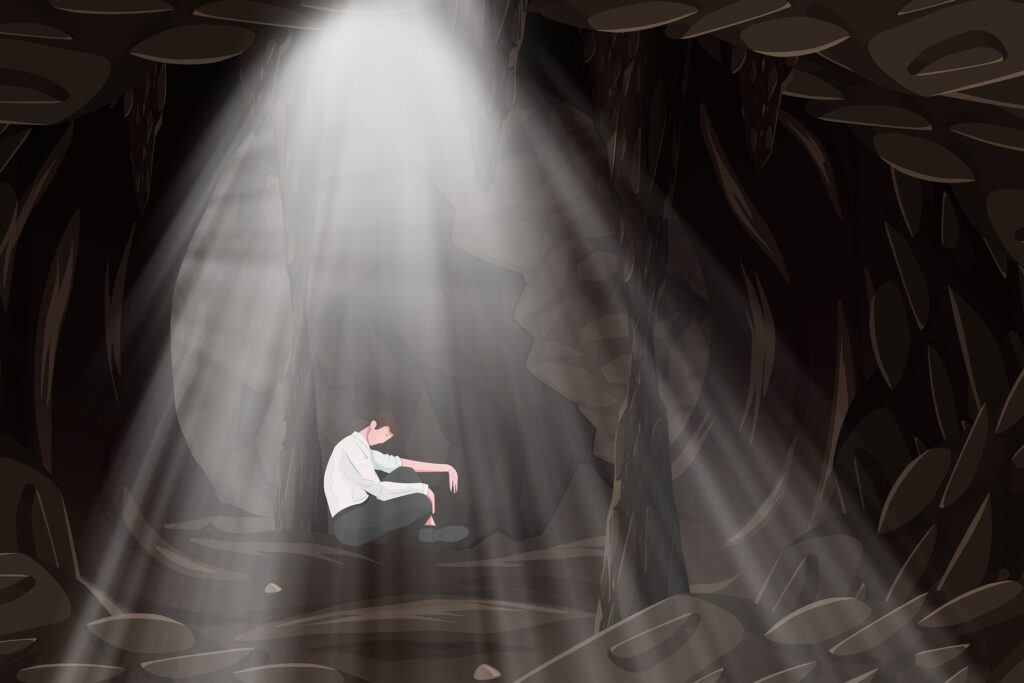guest blog by Sheri Leasure, LCSW
As winter slowly buds into spring with the promise of more sunlight, many people who suffer from seasonal depression are starting to feel a little better. But what if you find yourself or someone you love still struggling with low mood despite the longer days? How do you determine if a low mood is seasonal or if it’s a depression for which you need to seek help? If you are depressed, you’ll learn more in this article, and you might consider Dialectical Behavior Therapy (DBT) as a therapy for depression.
How do I identify depression in myself or someone I love?
Signs and symptoms of depression include at least two weeks of:
- Low mood most or every day which may include crying spells with no obvious cause
- Fatigue, feeling very heavy in your body
- Loss of interest or pleasure in activities you normally enjoy
- Wanting to isolate or withdraw from social interaction
- Trouble sleeping or wanting to sleep far more than average
- Lack of appetite resulting in weight loss or increased emotional eating resulting in weight gain
- Getting angry or frustrated over things that would normally not bother you
- Thoughts of death, suicide or not wanting to be alive
- Trouble focusing on work, schoolwork or conversations
- Feeling overwhelmed when making decisions
Children may become clingy, get into trouble at school and report headaches and stomachaches that have no known medical cause. Teenagers may experience behavioral issues, start refusing to go to school, and begin spending an excessive amount of time in their bedrooms.
If most of these symptoms sound familiar, and especially if you’ve been struggling for a while, you may consider seeking help from a medical doctor or experienced therapist or counselor. Professionals can assist you with a treatment plan that usually includes a course of therapy to improve your ability to regulate your emotions. Dialectical Behavior Therapy is one such type of treatment that may help treat your depression.
Related:
What is Dialectical Behavior Therapy?
Dialectical Behavior Therapy is a type of talk therapy designed to help people who struggle with staying present in the moment. They may experience powerful emotions and urges to act on their emotions in ways that are not healthy for them and potentially detrimental to others. DBT was originally developed as a treatment for borderline personality disorder (BPD), but it has now been used for a wide variety of disorders where emotional regulation is a problem.
People experiencing depression often struggle with powerful negative emotions or conversely may have trouble feeling anything at all. DBT-informed therapy that includes skills training can help those with depression process their emotions in ways that reduce symptoms.
DBT skills are often taught in group settings. You can also can be learn them in individual sessions. These skills address four main categories: mindfulness, distress tolerance, emotion regulation, and interpersonal effectiveness.
Mindfulness skills teach you how to be present in the moment and become aware of your thoughts, feelings, and sensations without judgment. Distress tolerance skills teach you how to cope with difficult emotions and situations without resorting to destructive behaviors. Emotional regulation skills teach you to manage your emotions in a healthy way. Finally, interpersonal effectiveness skills teach you how to communicate effectively and get your needs met in relationships.
Example of a DBT skill – Checking the Facts
Checking the facts is one type of DBT skill developed to increase emotion regulation. Here’s a scenario illustrating how this DBT skill works to help with Depression: Imagine that you had a hard day at work. You come home exhausted and need some support, so you text your best friend asking to hang out. Ten minutes go by. You check your phone but there’s no reply. A half hour goes by. Still no response. At this point, you are starting to feel agitated and irritated. Painful thoughts arise. “What is taking so long? Is my friend mad at me? What did I do? Don’t they care about me anymore?”
Another hour goes by. You call your friend, but it goes to voicemail. Now you start to get even more upset, maybe even convincing yourself that your friendship is over and it’s somehow your fault. You begin to feel sad, abandoned, lonely, and rejected.
Without knowing exactly what is happening, your mind is filling in the blanks with thoughts that provoke strong emotions like sadness and despair. If you struggle with depression, your mind may be filled with thoughts like these often. This results in chronic feelings of sadness.
In this scenario, you could practice checking the facts. First, you would notice and name the emotion as well as the event that prompted it. (My friend hasn’t texted back and I’m feeling rejected). You would then identify the thoughts that are creating or exacerbating your distress. (My friend is mad at me and never wants to see me again!). Next, you ask yourself “What evidence do I have to support these thoughts? And are there any other possible explanations as to why my friend hasn’t responded?”
For example, you may challenge your current assumption that your friend is intentionally ignoring you. Consider the following alternative interpretations: “Maybe they are out for dinner and not looking at their phone. Maybe their phone is on a charger or turned off. Maybe they are bathing the kids or putting them to bed and it is taking a long time. Maybe they’re on an important call already.” These thoughts offer a wider range of possibilities to the mind, causing it to have to consider the idea that your friend’s delayed reply may not be personal. It may have nothing to do with you at all. If you allow your mind to consider other ideas, your emotions may shift as well. You may begin to feel a little better while you wait for your friend to reply.
Related: To (Radically) Accept or Not to Accept: That is the Question
What is an individual DBT session like?
You might be wondering how your depression will be treated in therapy, and specifically what a DBT session is like. Your therapist will often begin a session by checking in on how the week has been, and how you’ve been feeling overall. You will have time to describe any pressing concerns that have come up. You and your therapist will then work together to determine what DBT skill may be most helpful to you for the coming week.
Your therapist will describe the new skill, often providing a worksheet or written description of it, and give you time to ask questions and get clarification. You will then have a chance to identify what possible scenarios may arise where you can use the new skill. Some therapists will even have you practice the new skill during a session using role-playing so that you can get a feel for how the skill may be used.
At each new session, you may review recent scenarios where you used your skills while talking about ways to practice them more effectively.
How long does DBT take?
Completing all the skills training in the DBT curriculum takes about six months to a year.[i] This is not a guarantee, of course, as you and your therapist may determine that more or fewer sessions are needed depending on how you’re feeling and what progress you’re seeing. DBT is, however, intended to primarily be a skills-based treatment that is complete once the client has learned and is effectively applying all the skills in the course.
Resources for DBT
You can find additional information on DBT in the description provided by the Depression Bipolar Support Alliance.
Are you wondering where to go to treat your depression? If you suffer from depression and think that DBT skills training might be a good fit for you, trained therapists at Life Care Wellness are here to help! Please reach out to us in our Northern Illinois locations in Glen Ellyn, Chicago (Jefferson Park), Sycamore, or Yorkville. Our therapists can see clients either in-person or via telehealth.
Sheri Leasure, LCSW, is a Licensed Clinical Social Worker with training in Internal Family Systems, Somatic Experiencing, Eye Movement Desensitization and Reprocessing (EMDR), Mindfulness, and Dialectical Behavior Therapy (DBT). She sees clients of all ages in the Glen Ellyn and Sycamore offices.






